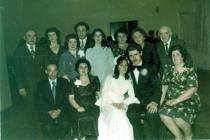This photograph was taken at home in Riga in 1939. I know nothing about the occasion they gathered at the table in our apartment. The photograph was taken by one of our relatives.
My maternal grandfather Hirsh-Leyb Kravets was a tailor. One day he gave up his business and became an owner of a furniture store. It seems to me he had several stores. My grandfather perished during World War II on the territory of the Latvian Soviet Socialist Republic. We do not know neither the way he died, nor when it happened.
Here I'd like to tell some words about our apartment. When we returned to Riga from Livani in 1925 Daddy at first rented a small two-room apartment in a large house. There was neither bath-room, nor a room for servants. Therefore we could not employ a parlourmaid. We lived there 13 years till 1938. By that time in our family there were already three children. Therefore we moved to a three-room apartment, where there was a nursery for me and my sister, a bedroom, a dining-room, a kitchen. The house was worse than the previous one. There was water supply, but no bathroom again. There was stove heating and (a sign of that time) woodsheds in our court yard. Furniture in our apartment was good as always. Of course! Both grandfather and father were professional furniture-makers! And one more: Daddy realized very well what it meant to have two daughters. We had two pianos for me and my sister, two sleeping sets: one for us, and the second one for our parents.
All sisters and brothers of my mother gathered at the table, except David, who perished during the WWI. Here what I remember about them.
Mother had senior sister Rosa Hirsh-Leybovna Lifshits, nee Kravets. She was born in 1895 and died in 1941. She worked as a doctor in Latvia in a small village.
Another mother's sister was Sofiya (Basheve) Hirsh-Leybovna Pleener, nee Kravets. She never worked and was uneducated. She lived in Riga. Her husband had a furniture shop. When the war burst out, they did not manage to evacuate in time, because their children were sick with scarlet fever. Nobody knows when and how they were lost, and nobody saw them any more.
My Mum had four brothers. David Hirsh-Leybovich perished during World War I.
Lazar Hirsh-Leybovich was a furniture-maker. Before the war uncle Lazar sent his wife and two children to his mother-in-law to a small town situated close to the Soviet border.
Uncle Lazar went to evacuation together with us in the same train carriage. Our train went by that town, where his family stayed. He decided to leave the train and try to find them and save. But he did not even reach his family: he got the lead on his way. And his wife, children and mother-in-law were also shot by Germans. We got to know about it only in 1945 from the letter of their neighbor.
Borukh Hirsh-Leyboich, his wife Sonya and two children Ekhiel and Dovid visited us rarely. We were not good friends. They did not regard us with favor: we were poor relatives for them. When the war burst out, uncle Borukh came to ask advice from my father: all our relatives acknowledged him as worldly wise. Above the table of my sister a portrait of Lenin 2 hung. Uncle Borukh advised to take it off immediately. We never saw anybody of uncle Borukh's family again.
Pinkhus Hirsh-Leybovich was born in 1912. He survived during Holocaust, because he managed to evacuate together with his wife Sonya and two daughters Mirra and Fruma. He died in Riga in 1988 from heart attack. He worked as a furniture-maker. In contrast to my father he was skilful in writing reports in Russian. Daddy was envious of him, he said 'You see, he is talented from birth.'
My daddy disliked the Kravets (mother's relatives), but tried to be on good terms with them. Pinkhus and Lazar often visited us, and we did the same. Aunt Sonya (my mother's sister) lived rather far from us, therefore we met her not very often. There were a lot of occasions to meet our relatives: we celebrated together not only family holidays, but also Jewish ones.

























